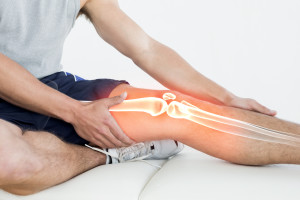When An Injury Turns Into Chronic Pain

Research has shown that pain affects over one hundred million people, as reported by primary care physicians. Addressing pain can be simple for some and extensive for others, depending on the type of injury. You may have a simple fix, like a broken finger that gets a splint and is healed with a few months. Or you may have a pain that can’t be found through any scans, tests or examinations and lasts for years.
Sometimes it can be both. What you think is going to be a quick fix and starts out as an injury turns into chronic pain and a long treatment period. There are many different types of injuries and all of them have the potential to lead to chronic pain if not managed correctly.
Injuries
Acute pain is the pain typically associated with an injury. It is our body’s way of yelling,
“Hey you, there is a problem here. Fix it soon or else.”
Injury is defined as damage, harm or loss, usually from an outside source. There are many types of injuries, just ask any personal injury attorney. I bet you have experienced at least one in your lifetime, if not more. Have you ever sprained your ankle, cut yourself with a knife, or missed the nail and hit your thumb when using a hammer? Then you have had an injury. Ever been in a fender bender and for the two weeks following had a stiff neck? Then you have had an injury.
There are sports related injuries such as pulled muscles, dislocations and shin splints. There are work related injuries that include machine related or toxic substance exposure. There are also construction related injuries, pet related injuries, car related injuries, playground injuries, the list goes on and on. Basically, if you are living your life, you are susceptible to an injury. But that is no reason to stop living. Not at all. Injuries are very fixable and can heal within a short amount of time.
The medical world defines injuries in more specific terms, like soft tissue, bone, skin and by the body part that is injured. Injuries typically last less than 12 weeks. When an injury turns into chronic pain, it can lead to a long treatment period.
How Pain Becomes Chronic
If you are struggling with an injury in which the pain just won’t go away, then you may be experiencing chronic pain. Pain becomes chronic when it does not leave after three or four months. Your three or four months may be feeling more like three or four years. Persistent pain puts a strain on all parts of our lives and can slow us down or stop us altogether.
One study found that your body’s cells can keep a memory of the injury. Even though the injury is healed and gone, the memory of that pain stays with you in the nerves located around the injury. This happens because your nervous system remains sensitive long after the actual injury has healed.
Chronic pain tends to show up more in older adults, but it does not discriminate. It can affect people of all ages. People who have had surgeries, injuries and are obese tend to experience chronic pain more than others. So, just what is chronic pain?
Chronic Pain
Chronic pain is the type of pain that loves to hang around and make your body its home for twelve weeks or more. It’s like that cousin who came for a week’s vacation and is still living with you three months later. It does not go away and it can interfere with your daily routine.
Chronic pain can appear in many different forms. A few examples are headaches, fibromyalgia, back pain, diabetes and arthritis. Sometimes pain can affect you with no diagnosable reason. Over 30 million people are suffering from chronic pain in the United States alone.
The good news, you can get help in managing your pain.
The Importance of Chronic Pain Management
Chronic pain is not something that will just magically disappear and it is not something you should try and manage on your own. A pain management physician is the person you need to help you overcome your pain related issues. He or she has a medical degree and specialized training in pain. They are experts on all things pain. Their goal is to treat your symptoms so you can live a functioning life.
A pain management physician will most likely recommend a variety of treatments and therapies to help you cope with your pain. This is because it is important to treat all areas of your body that will most likely be affected by your pain. The more experts helping you, the better. They will be your own special treatment team and all of them will have the same goal, easing your pain as best they can.
Build Your Team
Your team should consist of a variety of healthcare professionals, friends and family members who truly want to see you succeed in the management of your pain. You do not want people in your life who just want to give you pain pills and let you sleep all day.
A pain management physician is one who can prescribe appropriate medications and monitor you closely to make sure the medicines are working and if not, help you find other medical treatments. They can also examine you on a regular basis and measure for improvements.
A psychologist should be on your team. They can help you work through the mental health issues you may encounter when it comes to pain. They can also help you treat your depression, anxiety or stress that is related to the pain.
A physiatrist and an anesthesiologist are also good team members. A physiatrist has an education in physical medicine and rehabilitation and can treat problems with the brain, nerves, bones, muscles, tendons and more.
A physical therapist can teach you specific exercises and movements that will help you ease pain where it is persistent.
Alternative therapies can also be beneficial to help ease some of your pain. Therapies such as acupuncture, yoga, massages and herbal remedies. There are many holistic practitioners who can help you focus on the mind, spirit, body connection to ease your pain.
Your friends and family should be on your team to help you stay positive, get some exercise, eat healthy and meet other needs your doctors can’t. They are not in your life to enable you, however, only to assist you in completing your own tasks.
Just because you have chronic pain does not mean you can’t have a happy life. There are many resources to assist you in managing your pain. You are valuable, purposeful and worth the effort!

